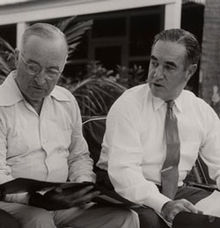Fred Lawton | |
|---|---|
 Lawton (right) with Harry S. Truman | |
| Member of the United States Civil Service Commission | |
| In office 1953–1963 | |
| President | Dwight D. Eisenhower John F. Kennedy |
| Preceded by | Frances Perkins |
| Succeeded by | L. J. Andolesk |
| 9th Director of the Bureau of the Budget | |
| In office April 13, 1950 – January 21, 1953 | |
| President | Harry S. Truman |
| Preceded by | Frank Pace |
| Succeeded by | Joseph Dodge |
| Personal details | |
| Born | Frederick Joseph Lawton November 11, 1900 Washington, District of Columbia, U.S. |
| Died | November 16, 1975 (aged 75) Washington, District of Columbia, U.S. |
| Political party | Democratic |
| Education | Georgetown University (BA, LLB) |
| Awards | |

Frederick Joseph Lawton (November 11, 1900 – November 16, 1975) was an American bureaucrat who served as the ninth Director of the Bureau of the Budget. Lawton was born in Washington, D.C., and became a lawyer and an accountant. He spent most of his professional career working with the government bureaucracy. He helped President Franklin D. Roosevelt wager with members of Congress to support the Fair Labor Standards Act. He first joined the Office of Management and Budget as an executive assistant in 1935. He also served as an adviser to Congress. In 1947, he became an administrative assistant to President Harry S. Truman. He was appointed to the post of Director of the Bureau of the Budget in 1950, and held the position until 1953. President Dwight D. Eisenhower appointed Lawton to a term on the United States Civil Service Commission after he left the Bureau; he served from 1953 to 1963.
His economic policy consisted of making budget cuts among various departments of the federal government. One of his primary contributions was in helping to re-design the Bureau of Internal Revenue, action which led to the creation of the Internal Revenue Service. Lawton advocated a civil service, rather than a patronage system for tax agents. He opposed a number of plans in Congress, including a fair trade bill and attempts to decentralize the federal offices in Washington, D.C., to other areas of the country.
© MMXXIII Rich X Search. We shall prevail. All rights reserved. Rich X Search
